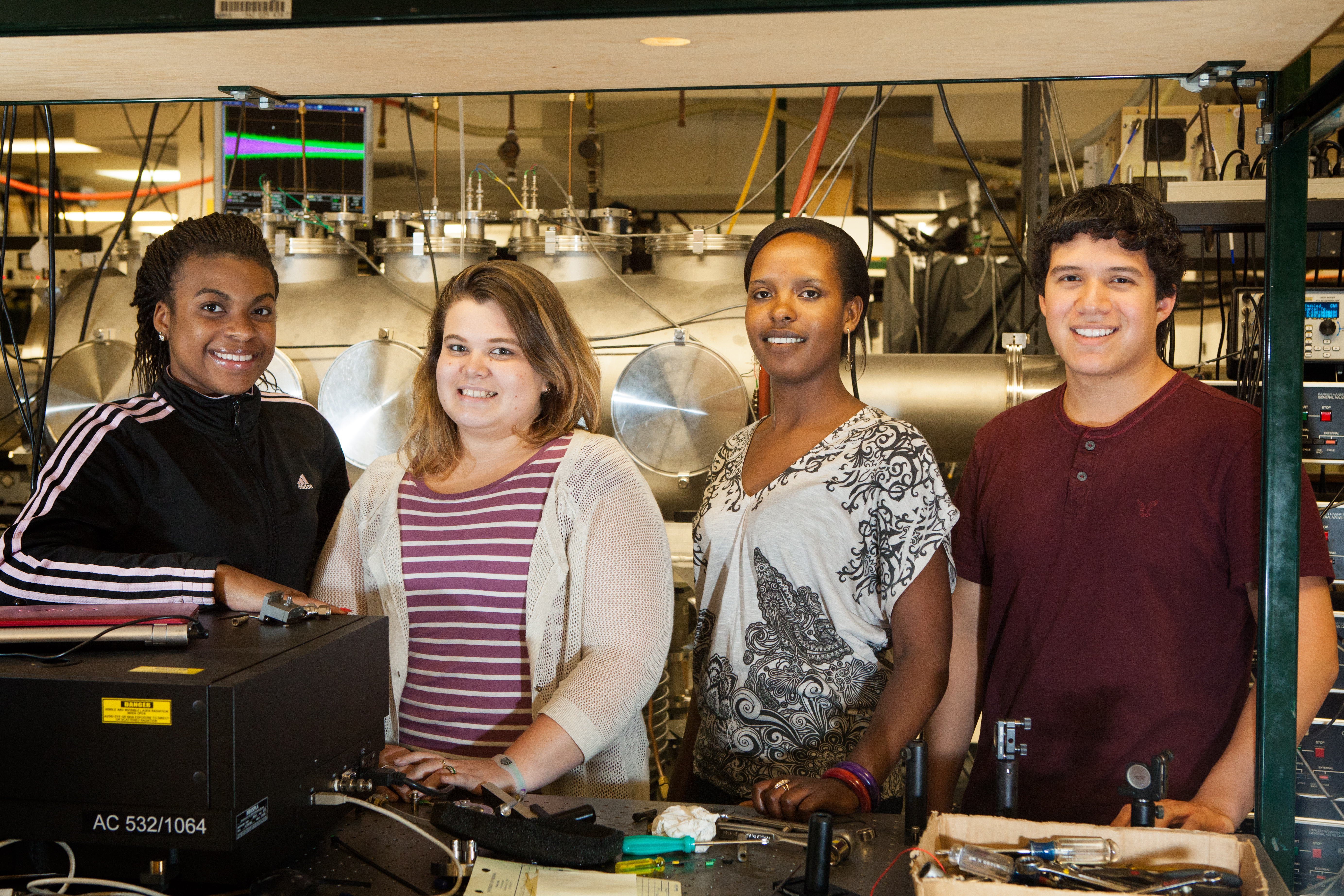Undergraduate research opportunity provides student with a lifetime career achievement

Finding a new molecule in space can be a lifetime achievement for astrochemists. A team of undergraduate researchers, one of which is a Virginia Tech student, is adding the accomplishment to their resumes and working to publish the discovery, thanks to a research program for underrepresented students in the science, technology, engineering, and mathematics (STEM) fields.
It took David Vasquez of Virginia Beach, Va., a sophomore majoring in biochemistry in the College of Science, and a team of three other undergraduates just one week to find it. The students worked this summer at the University of Virginia under the mentorship of Brooks Pate, professor in the Department of Chemistry, as well as graduate students in his lab.
“The researchers at our lab said what we did in the first week is what astrochemists strive to do in their whole career – and some are never successful,” said Vasquez. “When they said that, it hit that we discovered something big. It was crazy to think that in my first research experience as an undergrad, we successfully found a new molecule.”
The Virginia-North Carolina Alliance for Minority Participation (LSAMP), sponsored by the National Science Foundation, funded Vasquez’s research. The purpose of the program is to assist underrepresented undergraduates in successfully graduating from college and ultimately pursuing STEM careers, and students have an opportunity to conduct research as undergraduate students. Vasquez is a participant in the Alliance for Minority Participation here at Virginia Tech.
Three additional students also worked at Pate’s lab through the program – Kennedy Johnson, a biology major at Johnson C. Smith University; Jolie Nyiramahirwe, a chemistry student at Piedmont Virginia Community College; and Nicole Sciortino, a forensic science major at St. Augustine’s College.
The students put two molecules – methyl cyanide and ammonia – in a vacuum chamber and hit them with electricity. “Because it is hit with so much electricity, the molecules just pretty much break up and forms radicals, because it can’t handle all of that energy,” said Vasquez. “Then, in the chamber, these radicals are going to combine to form new molecules.”
In an experiment within the group’s first week at the lab, they formed a new molecule called cyanomethanimine. After creating it in the lab, the students compared their data to the publically available Green Bank Telescope data and found a match for their molecule in a region of space in the Milky Way Galaxy, more specifically the Sagittarius B2N region of the Milky Way Galaxy. The research team is now working on a publication on their discovery for submission to the Astrophysical Journal Letters.
Discoveries like this happen just four to five times a year on average, but cyanomethanimine is one of the more important molecules detected. It has pre-biotic importance since it can react with other HCN monomers leading to the formation of the nitrogenous base adenine, which is a necessity for RNA, DNA, and life.
The experience has Vasquez considering a career in research, potentially in a field that applies biology and chemistry to space. “With this opportunity, I realized research is a lot of work,” said Vasquez. “The people in the lab said they often work at least 60 hours a week. But I realized its something I can see myself doing because you learn so much.”
Vasquez is even closer to this goal, recently winning the Virginia Space Grant Consortium Undergraduate STEM Bridge Scholarship. NASA and the Commonwealth of Virginia fund the competitive scholarship program, with its goal to increase minority participation in STEM-related research and careers. The program also helps students enter the NASA pipeline, opening up opportunities for NASA internships, among other benefits.
In addition to wrapping up work from the detection of the interstellar molecule and his newest scholarship program, Vasquez plans to do additional undergraduate research while also serving a mentor for Da Vinci: The Biological and Life Sciences Learning Community.
Dedicated to its motto, Ut Prosim (That I May Serve), Virginia Tech takes a hands-on, engaging approach to education, preparing scholars to be leaders in their fields and communities. As the commonwealth’s most comprehensive university and its leading research institution, Virginia Tech offers 240 undergraduate and graduate degree programs to more than 31,000 students and manages a research portfolio of $513 million. The university fulfills its land-grant mission of transforming knowledge to practice through technological leadership and by fueling economic growth and job creation locally, regionally, and across Virginia.




